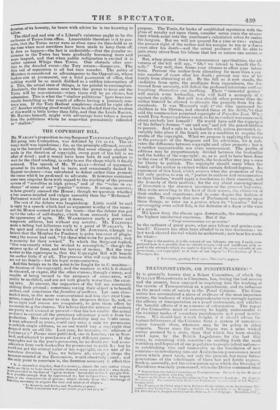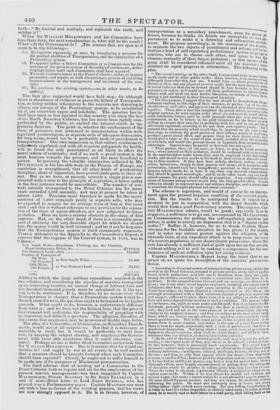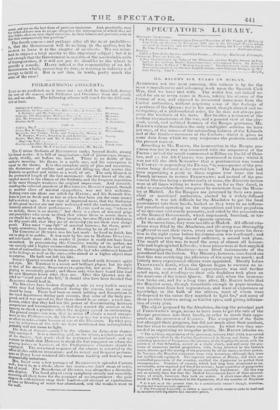TRANSPORTATION, OR PENITENTIARIES? *
IT is generally known that a Select Committee, of which Sir WILLIAM MOLESWORTII is Chairman, has, during the lust session and the present, been engaged in inquiring into the working of the system of Transportation as a punishment, and its influence on the moral state of society in the Penal Colonies. The Com- mittee has accumulated a mass of evidence of the most important. nature, the tendency of which preponderates very strongly against the efficacy of transportation as a penal instrument, and exhibits the baneful effects of it as a means of colonization. The report of the Committee must of necessity be highly unfavourable to the existing modes of secondary punishments and penal instiga- tions. We should hail it with delight, if it should advise the instant deliverance of the Colonies from a system of monstrooe injury towards them, whatever may be its policy in other respects. Never since the world began was a more wicked course pursued by a state, than that which has been steadily acted upon by the British Legislature for the last fifty years, in colonizing with convicts—in sending forth the most worthless and depraved of our population to people infant nations— in establishing vice and immorality as the foundation of nem societ ies—in introducing into our Australasian possessions a moral poison which must taint, not only the present, but many future generations of the inhabitants of those fair and fertile regions. Such is, assuredly, not the colonization upon which the blessing of Providence was early pronounced, when the Divine command went • Report from the Select CommiDee as Transportation. Or red by the II use of Commons to be printed, Ilth Jul) 1507.
Report on the State of Prison Discipline in Van Diemen 's Laud, By Capb.it
M coNorm Dre,nied to both Moises of Patti:merit by con,,altel of lwr Map•st, Session 134.
S Priork et de l'Etat achud de is R.,forme Penitent lai., et des I n ut ions Po,- tentives, anx Etats rots, en France. en Sit i■SO,en Aughlerre. et en Itelgupp. Ed. DUCPETILUX, invecteupGigiend ties Prim ms, Belgiqu Bruxelles, 1•437 „
forth—" Be fruitful and multiply, and replenish the earth, and subdue it ! "
When Sir WILLIAM MOLESWORTH and his Committee have done their duty, the next consideration is, what will be the result ? What will the Government do ? LThe courses that are open to it seem to be the following- 1st. To legislate vigorously, at once, by introducing a measure for the gradual abolition of Transportation, and the substitution of a Penitentiary system.
2d, To appoint either a Select Committee or a Commission for the revision of the present system of Secondary Punishments, defer- ring legislation until such Committee shall have reported.
3d, To send Commissioners to the Penal Colonies, either to inquire personally, and report, or with discretionary powers of enforcing upprovements in the management and treatment of the con- victs.
Ith, To continue the existing system,—or, in other words, to do nothing.
The first plan suggested would be a bold step; for although there is abundance of evidence to prove the failure of Transporta- tion, as being neither reformatory to the convicts nor deterring to others, our notions of the Penitentiary system, to be substituted for it, are somewhat vague and indefinite. The question has in- deed been more or less agitated in this country ever since the loss of our North American Colonies, but has never been rightly com- prehended by the public, or excited the interest which its im- portance deserves. The point is, whether the confinement of the class: of prisoners now sentenced to transportation within well- regulated penitentiaries, in separate cells of adequate dimensions, for long terms, would not be a preferable mode of punishment to transportation? Our own impression is, that solitary confinement, judiciously regulated, and with all requisite safeguards for health, will be found the only punishment at all likely to effect the moral reform of criminals; and if so, such a penal system is the most humane towards the prisoner, and the most beneficial to society. In perusing the valuable information collected by Mr. Dix PETI aux in his late able work on the Prisons of Europe, our conviction is strengthened, that all other kinds of penitentiary discipline, short of separation, have proved inadequate to their ob- ject. But as we have, at present, scarcely a single prison con- structed with a view to the principle of separation, a heavy outlay in the first instance would be unavoidable. The number of con- victs actually transported to the Penal Colonies has for many years exceeded 4,000 annually, and may at present be taken at nearer 5,000. Provision must therefore be made for the impri- sonment of 5,000 criminals yearly in separate cells, who may
be expected to remain for an average term of four or five years each and this is without reference to any provision for the separa- tion of the class of minor offenders, not now subjected to trans- portation. Here we have a serious obstacle in the shape of first expense. But, on the other hand, if there is a reasonable pros- pect of attaining the very desirable object for which we should pay, the money would be well invested: and let it not be forgotten that the Transportation system is itself enormously expensive.
From a statement in the Appendix to the Committee's Report, it appears that the expense of the Convict system, in 1834, was as f t llows-
;Sew South Wales—Provisions, Clothing, &c. for Convicts, Penal Settlements, Police, &c X112,653 Van Diemen's Land—ditto 115,053 Expense of Transport of : 392 Males to New South Wales 57,400 321 Females 1504 Males ;316 Females to Van Diemen's Land 32,125 M.S33 £317,231
Adding to which the large military expenditure required in the two colonies, and considering the number of convicts transported as an increasing number, an annual charge of between four and five hundred thousand pounds must be calculated on if the sys- tem is to be continued. It is, therefore, by no means clear that Transportation is cheaper than a Penitentiary system would be ; though even if it were, the question ought to be treated on far higher grounds. What ought to be, however, is unfortunately different from what is ; and we hare not the faintest hope that the present Government will undertake the responsibility of grappling with so important and difficult a question. The adoption, therefore, of the course first suggested, may be pronounced highly improbable. The plan of a Committee, or Commission, on Secondary Puni4a- ments, would not at all surprise us. Not that it is necessary cr desirable in itself; but it would be preferable to total inac- tion, by keeping the subject stirring, and supplying the Govern- ment with more able assistance than it could otherwise com- mand. Perhaps no one is better fitted to conduct such a task than S:r " iLLIAM MOLESWORTH. But is it certain that lie would un- dertake it ? and ought he not at all events to be well assured that a measure should be brought forward when such Committee should have reported ? Clearly, he ought not to suffer himself to be made use of for purposes of Ministerial procrastination. The third scheme—that of sending out a Commission to the Penal Colonies both to inquire and act for the amelioration of the present convict management—has been suggested by Captain MACONOCHIE, Private Secretary to Sir JOHN FRANKLIN, in sort of semi-official letter to Lord JOHN RUSSELL, who has printed it as a Parliamentary paper. Captain M Am.:nettle went out with a bias in favour of the existing practice, and his views arc now strongly opposed to it. Ile is in favour, however, of transportation as a secondary punishment, even for mind fences, because he thinks its details are susceptible Of smelt prevenient as to make it a deterring and reformatory went. He proposes accordingly, in the treatment of thy: to separate the two objects of punishment and reform,oantduittilvit: troduce a kind of self-regulating probationary system gangs convicts, who are to choose each other, and agree to associates here attained mutually of their future probation; so that no onethe
attained an equal progress in reformation. The toll .• gang shall be considered reformed until all his ass • h plan.
" The moral training, on the other band, I recommend to be in employment on the roads and in other public works : these, however, to be condirere eeq differently from what they now are. I would have no direct punishment flicted on them, nor any physical coercion used ; but the most by in, of moral influence that can be devised should be here brought to heal, '0'11-1,-; prisoners, or rather, as I would now call them, probationers, to induce the the behave well, and work out their further liberation, on tickets of leave,
spiring a just confidence in their future good intentions.
" Fur this purpose, I suggest that the men should be brought from the pu nishment stations, to this stage of their sentence, in parties, (say of six.) la; should choose each other, and agree to run the chances of their future probation blether. Thus, after a man has completed the period which, aeconlingsinttoothhebeki.l original sentence, he must remain under direct punishment, he would still re. cumstanced, so far to believe in his good intentions for the future willing to connect their own fate in probation with his, and to rise and fall, an afterwards explained, according to his and their own conduct jointly. And I contend that the necessity which would thus be imposed on all,
en a
main indefinitely longer, until he could persuade other five men, similarly tit first stage, to cultivate the good opinion of their fellows, would, of itself alone, produce a great moral effect, and prepare them for their future trial.; fur it would give a value to the social virtues usually excluded from the receptacle of criminals, and would also prevent favour or hypocrisy from acquiring undue advantages. Superiors may prevent
partial or deceived, but not equals.
" These parties, then, (of six, more, or fewer, as may be found practically best,) when entered on their probation, should be reckoned with every evening by the superintendent under whom they may be employed in the Government works, and should receive marks in his book to their credit or discredit accord. ing to their conduct. If they have been orderly, obedient, zealous, intentive, active, industrious, cleanly in their persons and rooms, civil, temperate under provocation (should such have beeninffered,) punctual in their attendance at prayers, school, work, &c. or have in any other way deserved commendation, they should be gainers accordingly ; and if, on the other hand, any one hat de served censure, his party should suffer in proportion. I am confident that title union of fortunes among several would have the best possible effect. It is not unknown already in improved naval and military discipline, and is always found to constitute the strongest physical and moral restraints."
The scheme is ingenious, and would of course be an improve- ment upon the present hopeless condition of the convict popula- tion. But the results to be anticipated from it cannot for a moment be put in competition with the moral benefits which would flow from a good Penitentiary system. The expense, Cap- tain MACONOCHIE admits, would be great ; especially if, as he suggests, a nobleman is to go out, accompanied by Mr. CR AWFORD, as Commissioners for putting the self-regulating machine into action, in order to convey an impression that it is " dignus vindice nodus I" Suffice it, however, for us to thank Captain MAC0. NOCHIE for the laudable attention he has given to the sulject, and to enter our solemn protest against the adoption, at the eleventh hour, of any expedient which is to perpetuate the curse of a convict population in our Australasian possessions. Great Bri- tain has already a sufficient load of guilt upon her on this account, without adding evil to evil by making a compromise for the con- tinuance of such an infliction upon her rising colonies.
Captain MACONOCHIE 'S Report being the latest that we are aware of, we quote his description of the convicts present con- dition.
" According to the actual system of transportation, prisoners are, on their first arrival in the Penal Colonies, assigned to private service, at the will of a.public board, which endeavours as it best can to distribute them fairly and equally among the settlers, according to certain conventional rules laid down for its guidance. In the assigned service thus entered on, no wages are allowed to be given ; nor is any other moral impulse employed, excepting the remote hope of indulgence after four, six, or eight years, according to the original sentence. Until these elapse, the labour imposed is strictly coerced or shire labour; and although accompanied with a fixed minimum amount of physical maintenance and support, sufficient to place above want, it is yet subject to all the &geom• forts and moral degradations incident to such a condition. The men ate lodged in outhouses, six, eight, or more under a stable-roof; they sleep hereon truckle- bedsteads, generally without undressing ; the floor is eartl en, and often very soft; they cook and cat in the same place, or in one immediately adjoining, always in the roughest manner ; and they are subject to the most severe regular tions, which any master can get enforced on appeal to a niazi-crate by op illy severe punishments. This is the usual picture in the cumin!. districts: in the towns there is more comfort, (sometimes in the case of a good house servant there is even too much, consistently with a state of puni,lorierrt.) but there is much more temptation. Nut being allowed wages, yet desirous of procuring in• dulgences, the prisoners too often steal to obtain means ; and all fly to liquor, whenever they can obtain it, to drown humiliation and care. " At the end of the several allotted petMils, each man may or,k fir, and, Iry cording to the report made of hint, may obtain or be refti-ed, a ticket of leave. In this, however, there is necessarily much uncertainty. The record kept of prisoners' conduct only embraces offences ; no official notice being taken of good ordinary behaviour,—as diligence, sobriety, obedience, honesty, fidelity, real, Or the like; and thus, as only that appears which has drawn .down magisterial censure, a careless fellow, however goed his disposition and intentions, evecialll it he has had an inditielent master, may have a long list against him ; while thorough villain, more happily circumstanced, or perhaps f the very power of deception which Ids practice in villany gives him, may have few or trace. When the ticket is obtained, a particular district is assigned in which the re- cipient must reside. Within it he Inv choose his master and residence, and receive wages • but under a recent statute he is not allowed to acquire property. He must attend frequent musters, and may not change his residence without informing the police. Ile must also constantly sleep at home, and return thither before eight o'clock every evening. For very trifling irregularities, he is liable to have his ticket suspended, or entirely taken away ; in either of which cases, he is usually sent to bard labour in a road-party, thus falling back on the and not on the best form of previous treatment. And, practically, very worst, w ticket-of.leave men do eseape altryether the interroption option to which they are thug liable, often on very slight nrcasiuns, in their !about s and pursuits, even in this their comparatively free position."
The fourth course—and perhaps after all the tosst probable— is, that the Government will do nothing in the matter, but be content to leave it to the chapter of accidents. We are reluc- tant to suppose a total apathy to this important subject ; but it is not enough that the Government is sensible of the incalculable evils of transportation, if it will not put its shoulder to the wheel to provide a remedy. Heavy indeed is the responsibility of an Ad- ministration which, perceiving its duty, is wanting in industry usd energy to fulfil it. But is not this, in truth, pretty much the state of the case ?




























 Previous page
Previous page